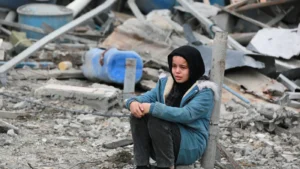The Gaza ceasefire may be falling apart. The real culprit is Israel.

A Palestinian child cries as she sits amidst building rubble in a ruined neighbourhood of Gaza’s southern city of Rafah on on 22 January 2025
Mouin Rabbani writes in Mondoweiss on 11 February 2025:
On Monday, February 10, Abu Obaida, spokesperson of the Martyr Izz-al-Din al-Qassam Brigades, the military wing of Hamas, announced that the movement was indefinitely suspending further Israeli-Palestinian exchanges of captives on account of repeated and continued Israeli violations of the agreement reached between the two in January of this year.
While Israel has indeed been violating the agreement in various ways, there is also more to the story. Most importantly this concerns Israel’s refusal to commence negotiations on the the agreement’s second phase, and U.S. President Donald Trump’s recent proposal for the forcible mass expulsion of Palestinians from the Gaza Strip to the Arab world.
The January agreement between Israel and Hamas is about more than an exchange of captives. At Israel’s insistence, it comprises three phases rather than one. During the first phase, scheduled to last 42 days (until the beginning of March) a limited exchange of captives and suspension of hostilities is to be accompanied by a partial Israeli withdrawal from the Gaza Strip, freedom of movement within the territory for displaced Palestinians, and a surge of urgently-needed humanitarian supplies.
Although the objectives of the second phase are identified as a conclusion of the exchange of captives, a durable ceasefire, and completion of Israel’s withdrawal from the Gaza Strip, the details have yet to be worked out. Rather, the parties agreed that negotiations for the second phase would commence on the 16th day of the first phase, and that the suspension of hostilities would persist while negotiations continue, even if these are not concluded by the end of the first phase. The third phase of the agreement, which primarily concerns reconstruction of the Gaza Strip, also remains to be negotiated.
Since concluding the agreement, Israel has continued with periodic attacks within the Gaza Strip, killing approximately 25 Palestinians since January 19th. While these violations are on a considerably smaller scale than Israeli violations of the ceasefire agreement reached with Lebanon late last year, they, needless to say, call into question Israel’s commitment to fulfilling its obligations.
On the humanitarian file, Israel has been obstructing and dragging its feet in a more systematic fashion. While there has indeed been a surge in supplies since the agreement came into force, Israel has been consistently preventing the entry of tents and caravans, particularly to the northern Gaza Strip. A significant issue under any circumstances given Israel’s systematic destruction of the Gaza Strip’s housing stock and the inclement weather in mid-winter, the issue has taken on clear political dimensions as well in the context of Trump’s proposal to permanently empty the Gaza Strip of its Palestinian inhabitants.
With respect to the scheduled Israeli-Palestinian negotiations on the second phase of the agreement mediated by Egypt and Qatar, Israeli Prime Minister Binyamin Netanyahu recently dispatched his negotiating team to the Qatari capital, Doha. But he gave his negotiators clear instructions not to engage in discussions on the second phase of the agreement. Rather, he is proposing to extend the first stage of the agreement so that it includes additional exchanges of captives. In other words, he wants to complete the captive exchange during the first phase and thus retrieve all remaining Israelis being held in the Gaza Strip, without having to complete the withdrawal of Israeli forces from the territory or commit to a durable ceasefire as envisioned during the second phase.
Netanyahu’s attempted sleight of hand, while slightly different, echoes the criticism he received last year from senior Israeli officers in response to his repeated refusal to conclude a ceasefire agreement by constantly introducing new conditions. Sign the agreement, they advised him, retrieve the captives, and once they’re back Israel can very easily manufacture a pretext to resume its military campaign.
Netanyahu has now additionally put forward a proposal whose elements are nowhere to be found in the January agreement and constitute an attempt to comprehensively rewrite it: in exchange for an Israeli commitment not to resume its genocidal military campaign, the Hamas leadership would be required to depart the Gaza Strip, dismantle its military capabilities, and terminate any role in governance and administration. Needless to say, the Palestinians are not going to concede to Israel around the negotiating table what it failed to achieve on the battlefield. In other words, the proposal is a non-starter.
